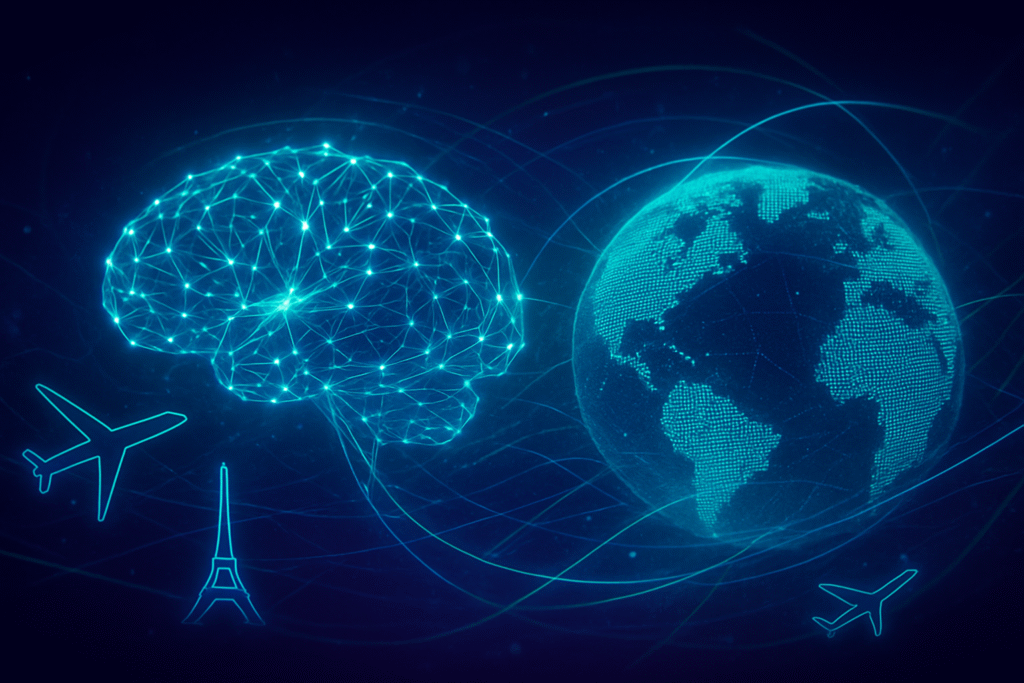
The global travel industry is currently in the midst of an unprecedented transformation, fueled by the rapid advancements and widespread integration of Artificial Intelligence. As of late 2025, AI is no longer a nascent technology but a fundamental force reshaping every facet of travel, from the initial planning stages to the in-destination experience. This technological paradigm shift is ushering in an era of hyper-personalized journeys, sophisticated predictive analytics, and unparalleled real-time adaptability, fundamentally altering how travelers interact with the world.
This AI-driven evolution promises not just smarter travel experiences but also a newfound predictability and seamlessness, addressing long-standing pain points and unlocking previously unimaginable possibilities. The market for AI in travel is booming, projected to surge from an estimated $3.37 billion in 2024 to nearly $13.9 billion by 2030, underscoring the industry's profound commitment to leveraging intelligent systems for competitive advantage and enhanced customer satisfaction.
The Technical Core: AI's Pillars of Transformation in Travel
The profound impact of AI on travel is underpinned by several key technical advancements that are fundamentally changing operational models and customer interactions. These include the sophisticated deployment of generative AI for bespoke planning, advanced machine learning for predictive analytics, and robust AI systems for real-time adaptability.
Generative AI, in particular, is at the forefront of crafting hyper-personalized experiences. Unlike traditional recommendation engines that relied on static data and basic filtering, generative AI models can understand nuanced user preferences, past travel behaviors, budget constraints, and even social media sentiment to create dynamic, unique itineraries. These AI agents can write customized travel guides, generate immersive visual previews of destinations, and even provide real-time alerts for travel requirements, moving beyond simple suggestions to truly bespoke content creation. Conversational chatbots, powered by advanced Natural Language Processing (NLP) and machine learning, act as intelligent virtual assistants, offering 24/7 support in multiple languages, assisting with bookings, and providing on-the-go assistance. Platforms like Trip.com and Google Flights (NASDAQ: GOOGL) have long utilized recommendation engines, but the integration with generative AI platforms like OpenAI’s (private) ChatGPT, as seen with Expedia (NASDAQ: EXPE) and Booking.com (NASDAQ: BKNG), allows for more intuitive, conversational interactions to refine travel plans and access real-time data. This shift from keyword-based searches to natural language interaction marks a significant departure from previous, more rigid planning tools, making travel planning more intuitive and less cumbersome.
Predictive analytics, driven by advanced machine learning algorithms, forms another critical pillar. By analyzing vast datasets—including historical search patterns, loyalty program data, seasonal trends, and pricing fluctuations—AI can accurately forecast demand, optimize pricing strategies, and recommend optimal routes and timings. Airlines, such as Delta Air Lines (NYSE: DAL), leverage AI-powered systems to dynamically adjust fares based on real-time demand and consumer behavior, maximizing revenue while remaining competitive. Hotels employ similar AI solutions for demand forecasting and dynamic pricing, ensuring optimal occupancy rates without alienating customers. Beyond pricing, companies like Sojern, a digital marketing platform, utilize AI-driven audience targeting systems that process billions of real-time traveler intent signals, generating over 500 million daily predictions. This capability significantly reduces audience generation time, allowing for more targeted and efficient marketing campaigns. These systems represent a significant leap from traditional statistical modeling, offering greater accuracy and the ability to adapt to rapidly changing market conditions.
Finally, real-time adaptability is dramatically enhanced through AI. AI-enabled platforms can dynamically adjust itineraries in response to unforeseen events, such as suggesting alternative flights or accommodations during a storm or recommending new activities if a planned event is canceled. Virtual travel assistants provide instant updates on flight statuses, booking changes, and local conditions, mitigating stress for travelers. The industry is also seeing a surge in "Agentic AI," where AI agents can autonomously understand complex goals, break them into subtasks, interact with various systems, execute actions, and adapt in real-time with minimal human intervention. This significantly supercharges operational agility, allowing travel companies to proactively manage disruptions and offer seamless experiences. Furthermore, the integration of biometric systems and AI-driven security at airports and borders contributes to real-time adaptability by streamlining check-ins and reducing waiting times, moving towards a future of truly borderless and friction-free travel.
Competitive Landscape: Who Benefits and Who Adapts
The AI revolution in travel is creating both immense opportunities and significant competitive pressures across the industry, impacting established tech giants, traditional travel companies, and nimble startups alike.
Online Travel Agencies (OTAs) like Expedia (NASDAQ: EXPE) and Booking.com (NASDAQ: BKNG) stand to gain substantially by integrating advanced AI into their platforms. Their vast user bases and extensive data repositories provide fertile ground for training sophisticated personalization and recommendation engines. By offering hyper-personalized itineraries and seamless booking experiences powered by generative AI and conversational interfaces, OTAs can enhance customer loyalty and capture a larger share of the travel market. Google (NASDAQ: GOOGL), with its dominance in search and travel tools like Google Flights and Google Hotels, is also a major beneficiary, continually refining its AI algorithms to provide more relevant and comprehensive travel information, potentially increasing direct bookings for suppliers who optimize for its AI-driven search.
Airlines and hospitality giants are heavily investing in AI to optimize operations, enhance customer service, and drive efficiency. Companies like Delta Air Lines (NYSE: DAL) are leveraging AI for dynamic pricing, predictive maintenance, and optimizing flight routes. Hotel chains are using AI for demand forecasting, personalized guest experiences, and automating routine inquiries. AI solution providers, particularly those specializing in generative AI, predictive analytics, and conversational AI, are also seeing a boom. Startups focusing on niche AI applications, such as sustainable travel recommendations or hyper-local experience curation, are emerging and challenging established players with innovative solutions.
The competitive implications are significant. Companies that fail to embrace AI risk falling behind in personalization, operational efficiency, and customer satisfaction. AI's ability to automate customer service, personalize marketing, and streamline back-office functions could disrupt traditional service models and reduce the need for manual interventions. This shift also creates a strategic advantage for companies that can effectively collect, process, and leverage vast amounts of travel data, further solidifying the market position of data-rich entities. The emergence of "Agentic AI" could lead to new business models where AI systems autonomously manage complex travel arrangements from end-to-end, potentially redefining the role of human travel agents and even some aspects of OTA operations.
Wider Significance: AI's Broader Impact on the Travel Ecosystem
The integration of AI into the global travel industry is not an isolated phenomenon but a crucial development within the broader AI landscape, reflecting a wider trend of intelligent automation and hyper-personalization across various sectors.
This development significantly impacts how travel fits into a more connected and intelligent world. It underscores the growing capability of AI to handle complex, real-world scenarios that require nuanced understanding, prediction, and adaptation. The widespread adoption of generative AI for travel planning highlights its versatility beyond content creation, demonstrating its power in practical, decision-making applications. Furthermore, the emphasis on seamless check-ins, biometric security, and AI-driven border control aligns with a global push towards more efficient and secure identity verification, impacting not just travel but also broader aspects of civic life and digital identity.
However, this rapid advancement also brings potential concerns. While AI promises smarter and more predictable travel, there's a debate about whether an over-reliance on algorithms might inadvertently narrow a traveler's perspective. If AI consistently recommends similar destinations or activities based on past preferences, it could limit serendipitous discovery and broader cultural exposure. Data privacy and security are also paramount concerns; the extensive collection and analysis of personal travel data for hyper-personalization necessitate robust safeguards to prevent misuse and ensure compliance with evolving global regulations. The ethical implications of AI-driven pricing and potential biases in recommendation algorithms also warrant careful consideration to ensure equitable access and avoid discrimination.
Comparisons to previous AI milestones, such as the rise of search engines or the advent of mobile booking apps, reveal a similar pattern of disruptive innovation. However, the current wave of AI, particularly with generative and agentic capabilities, represents a more profound shift. It's not just about digitizing existing processes but fundamentally reimagining the entire travel experience through intelligent automation and personalized interaction, moving beyond mere convenience to truly tailored and adaptive journeys. The focus on sustainability, with AI tools recommending greener travel alternatives and optimizing routes to reduce environmental impact, also positions this development within a broader societal trend towards responsible and eco-conscious practices.
Future Developments: The Road Ahead for AI in Travel
The trajectory of AI in the travel industry points towards an even more integrated, intuitive, and autonomous future, with several key developments expected in the near and long term.
In the near term, we can anticipate a continued proliferation of generative AI, becoming an indispensable tool for every stage of travel. This includes more sophisticated AI-powered concierge services that not only plan itineraries but also manage bookings across multiple platforms, handle last-minute changes, and even negotiate prices. The evolution of AI chatbots into truly intelligent virtual travel agents capable of end-to-end trip management, from initial inspiration to post-trip feedback, will become standard. We will also see further advancements in biometric check-ins and digital identity solutions, making airport and hotel processes virtually seamless for frequent travelers, akin to a "borderless" travel experience. Agentic AI, where systems can autonomously manage complex travel workflows with minimal human oversight, is expected to mature rapidly, supercharging operational agility for travel providers.
Looking further ahead, experts predict AI will enable truly immersive and adaptive travel experiences. This could involve AI-powered augmented reality (AR) guides that provide real-time information about landmarks, translation services, and even historical context as travelers explore. The integration of AI with IoT (Internet of Things) devices will create smart hotel rooms that anticipate guest needs, and intelligent transportation systems that dynamically optimize routes and timings based on real-time traffic, weather, and personal preferences. AI's role in promoting sustainable travel will also deepen, with advanced algorithms identifying and recommending the most eco-friendly travel options, from transport to accommodation and activities.
However, several challenges need to be addressed. Ensuring data privacy and security as AI systems collect and process ever-larger quantities of personal information remains critical. Developing ethical AI guidelines to prevent biases in recommendations and pricing, and ensuring equitable access to these advanced tools, will be paramount. The industry will also need to navigate the balance between AI automation and the human touch, ensuring that personalization doesn't come at the expense of genuine human interaction when desired. Experts predict that the next frontier will involve AI agents collaborating seamlessly, not just within a single platform but across the entire travel ecosystem, creating a truly interconnected and intelligent travel network.
A Comprehensive Wrap-Up: Redefining the Journey
The current state of AI in the global travel industry marks a pivotal moment in the evolution of travel. The key takeaways are clear: AI is driving unprecedented levels of hyper-personalization, enabling sophisticated predictive analytics for operational efficiency, and fostering real-time adaptability to manage the inherent uncertainties of travel. These advancements collectively lead to experiences that are both smarter and more predictable, empowering travelers with more control, choice, and convenience.
This development holds significant historical significance for AI, demonstrating its capability to move beyond narrow applications into complex, dynamic, and human-centric industries. It showcases the practical power of generative AI, the operational benefits of machine learning, and the transformative potential of intelligent automation. The long-term impact will likely see a travel industry that is more resilient, efficient, and profoundly personalized, where every journey is uniquely tailored to the individual.
In the coming weeks and months, watch for continued innovations in generative AI-powered travel planning interfaces, further integration of AI into airline and hotel operational systems, and the emergence of new startups leveraging Agentic AI to offer novel travel services. The ethical considerations around data privacy and algorithmic bias will also remain crucial discussion points, shaping the regulatory landscape for AI in travel. The future of travel is here, and it is undeniably intelligent.
This content is intended for informational purposes only and represents analysis of current AI developments.
TokenRing AI delivers enterprise-grade solutions for multi-agent AI workflow orchestration, AI-powered development tools, and seamless remote collaboration platforms.
For more information, visit https://www.tokenring.ai/.





